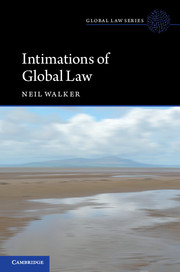3 - Seven species of global law
Published online by Cambridge University Press: 05 January 2015
Summary
Introduction: two visions of global law
In Chapter 1 we defined global law as any practical endorsement of, or commitment to, the universal or otherwise global-in-general warrant of some laws or of some dimensions of law. We noted that this was a broad definition permitting a cross-cutting range of internal distinctions. Global law so understood may or may not be sourced and institutionalised at the planetary level. It can be more or less actively endorsed and fully realised, and more or less concrete and positivised in its normative claim or orientation. It can also be either universal or merely planetary in scope or ambition, provided it meets a threshold requirement of not being confined by and to any particular sub-global territorial jurisdiction.
In the catalogue of global law set out below, each of these distinctions arises at various points, yet none provides the primary principle of classification. Instead this is supplied by a more basic form of variance that recalls one of the core dynamics of globalisation introduced in Chapter 1. That distinction lies between two conceptions and two very broad visions of global law; between two different ways of imagining how global law might shape or reshape the pattern of distribution and connection of law across the planet. One such conception reflects a focal concern to encourage a general dynamic of legal convergence, while the other conception reflects a focal concern to accommodate a general dynamic of legal divergence. Seeking to counter or overcome difference, a convergence-promoting conception treats global law as the object of collective agreement or cultivation, or as some other commonly acknowledged broad normative frame; this involves either a vertical arrangement of authoritative global rule-making or rule-application, or the global endorsement of some generic feature(s) of law. Seeking instead to manage difference, a divergence-accommodating conception employs global law as a means of tracking, harnessing and confining diversity; this involves either a horizontal framework of co-ordination of different legal regimes or some form of legal recognition and refinement of the separate elements of a multiverse of globally extendable normative orders. In a nutshell, while convergence-promoting approaches involve one or both of the attributes of hierarchy and normative singularity, divergence-accommodating approaches are characterised by the twin themes of heterarchy and normative plurality.
- Type
- Chapter
- Information
- Intimations of Global Law , pp. 55 - 130Publisher: Cambridge University PressPrint publication year: 2014

